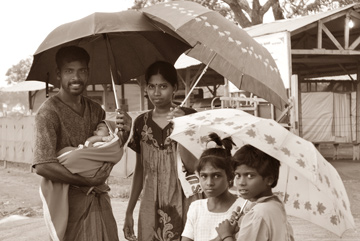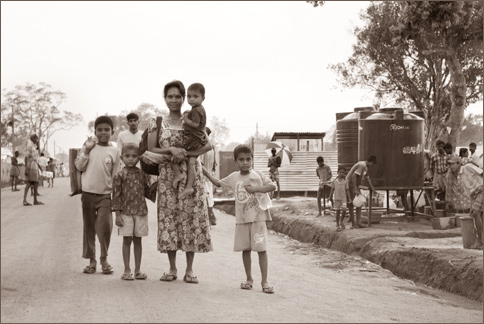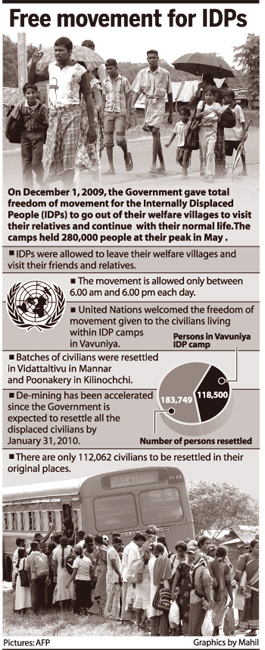IDPs breathe free
by Shanika SRIYANANDA
 They are free. They leave the camps in numbers to smell the true
meaning of freedom. They also return to the camps, when they feel living
in camps is more secure and comfortable than living alone. They are free. They leave the camps in numbers to smell the true
meaning of freedom. They also return to the camps, when they feel living
in camps is more secure and comfortable than living alone.
Kethishvari, Raja and his two children left the welfare camp as soon
as the government declared 'freedom of movement' from December 1. The
couple just left the camp with empty hands leaving bags full of things -
rations and kitchen utensils - in the tent.
"We just wanted to go and see our house. It is better to stay in the
camp until the government resettles us properly", they said.
The family, which had returned to the camp on the second day, said
that though they were happy to touch the ground after many months, they
were sad about what the LTTE had done to them.
"There were only debris and no house at all", said Raja, who was
displaced several times and ran with his family upto to Puthumathalan.
During the last days of the battle, they were saved by the soldiers.
 The family was provided shelter among 280,000 IDPs at the Manikfarm
welfare villages. The family was provided shelter among 280,000 IDPs at the Manikfarm
welfare villages.
They were kept under tough security to protect them from 'sleeping
LTTE cadres' until the screening process was completed. With greater
difficulties, the government with the support of INGOs and NGOs fed,
sheltered and medically treated the unexpected mass exodus of IDPs whom
the LTTE had used as the human shields.
While criticisms are mounting from all corners of the globe,
especially from Western nations which tried to tie the noose by
threatening to impose certain restrictions, the government, tolerating
them, had a steady and meaningful 'match' in resettling IDPs. De-mining,
which was the main obstacle to sending people home, was expedited
purchasing more de-mining machines and deploying over 800 soldiers to
de-mine the former LTTE lands which were mined haphazardly.
The IDPs were given facilities - electricity, clean water and
medicine.
There cannot be a better living than one's `home sweet home', but no
doubt majority of IDPs are relatively having better living conditions in
the welfare centres than earlier.
After signing two documents - one with their personnel details and
the other the place of visit - Rajaratnam and family was waiting outside
to catch public transport to Vavuniya to go to his sister's place.
Hundreds of others too waited to board a bus.
"I have sold the rations and other things that the government gave us
to a family that was waiting to be resettled", he said.
Uncertain about how long they are going to stay in his sister's
house, Rajaratnam does not want to be a burden to her.
Majority of IDPs wanted to leave the camps just to visit their
relatives, to see the conditions of their houses and to attend to
private matters.
"We were thrilled to be outside the camp. We all thank the government
for making us feel free", he said.
From December 1, the government granted all the IDPs freedom of
movement which was one of the main demands of the international
community. According to United Nations High Commissioner for Refugees,
from the first day of the declaration people are leaving the camps in
numbers.
"We are encouraged by the Sri Lankan government's long-awaited
decision this week to allow increased freedom of movement for some
135,000 internally displaced people," an UNHCR statement reads.
Human Rights Minister Mahinda Samarasinghe at a media briefing, said
that over 70 per cent of the displaced people, who accounted for
280,000, are now living outside the welfare centres.
With the granting of freedom of movement, over 22,443 IDPs have left
the camps, but 9,773 displaced people have returned to camps during the
three days.
 "They are allowed to go anywhere they want. If they do not want to
come they can stay at a place of their choice", he said. "They are allowed to go anywhere they want. If they do not want to
come they can stay at a place of their choice", he said.
Less than 20 per cent of the Tamil war refugees kept in camps in the
North have availed themselves of the freedom of movement granted by the
government since December 1", the Minister for Human Rights, Mahinda
Samarasinghe, said here on Friday.
Samarasinghe told the media that over the past three days, only
22,443 of the 112,062 refugees resident in camps had availed themselves
of the facility. Of them, 9, 717 had come back, he added.
He said that over 20 per cent of IDPs availed themselves the freedom
of movement. " "This is a good proof that they don't want to leave the
camps as they have all the facilities", he said recalling how certain
international media had described the situation in these camps.
"They tried to show the world a negative picture and said that these
people were under detention. Today, these allegations have been
disproved with IDPs, who had gone out of camps, coming back", he said.
Minister Samarasinghe said that the entire credit of giving freedom
to these people, should go to President Mahinda Rajapaksa who was keen
from the beginning to release people soon. He said that the prevailing
security situation soon after the defeat of the LTTE had compelled the
authorities to keep the people until screening of each and every person
was completed.
Refuting the allegation that the IDPs were asked to return within 15
days reported in certain media, he said that the allegation was "utter
rubbish".
"We regret about the mischievous behaviour of these media", he said
adding that the media should be more responsible in their reporting.
The 180-days is the target given by the government to resettle the
IDPs and some quarters - locally and internationally - having doubts
about the deadline said that the time frame would not be feasible.
But expeding to reach the set target, the government said that the
IDPs would go home before January 31, 2010. " We are confident that all
the IDPs will be resettled in their areas before January 31 next year.
The de-mining activities have been expedited", Minister Samarasinghe
said.
"According to information, people are rushing out of camps in
numbers, but coming back. Some just walked around and came back", he
said.
Though the IDPs were allowed to move freely, their movement were
strictly restricted in former LTTE areas where the terrorists had buried
a huge swathe of land mines.
Brig. Udaya Nanayakkara, Military spokesman said that over 70 per
cent of the de-mining activities demarcated for resettlement have
completed and over 7,000 mines cleared so far.
He said that priority was given to de-mine the demarcated areas for
resettlement, roads and buildings. The A-9 that connects the North and
South, A-32, the Rice Bowl Mannar and Pooneryn, are cleared of mines.
Over 800 Army soldiers are now deployed to remove mines and 22
de-mining machines are in the field. Minister Samarasinghe said that the
government had purchased 17 de-mining machines and this showed the
commitment of the government to speed up the resettlement process.
V. Kanagalingam of Vivekananda Nagar, Kilinochchi had left the
Kadiragamar Village with his wife and two daughters on December 2. After
enrolling his two children to the Vavuniya school, he returned to the
Camp to attend to the administrative work in connection with the
resettlement process.
"We left the camp as we thought we would lose the opportunity to go
out. But living here is better than outside as we are provided with all
the facilities", he said.
Manilamani Kishorkhan is another who left the camp and returned. They
all want to be in camps until they are resettled.
He hopes to find a job outside as he has to build his house in
Kilinochchi which was badly damaged.
People, who are resettled, are given dry rations, roofing sheets, Rs.
20,000 cash and bank deposit of Rs. 50,000 and kitchen utensils.
***********
Welfare camps converted into open camps
December 1
No of IDPs left the camps - 9,143
No of IDPs returned - 5,120
December 2
No of IDPs left the camps - 6,900
No of IDPs returned - 1,992
December 3
No of IDPs left the camps - 6,399
No of IDPs returned - 2,766
Total No of IDPs left the camps - 22,443
Total No of IDPs returned the camps - 9,778 |
The Competent Authority and the Security Forces (SF) Commander Vanni
Major General Kamal Gunaratne said that the welfare camps have been
converted into open camps where people's movement was not restricted.
"They are very happy as they were allowed to move to places they
want. The choice is left with them and they can come back to the camps
on the date that they mentioned in the form", he said.
According to Maj. Gen. Gunaratne, the displaced people were asked to
fill two forms and to mention the date of arrival.
"They should return on the mentioned date and this is to make the
administration easy. We can keep a track on the number of IDPs gone out,
returned and disappeared", he said adding that the security forces have
to find out the whereabout of the disappeared.
The SF Commander said that the freedom of movement is just a
temporary measure taken to grant these people freedom to visit their
relatives and attend their private affairs before they are resettled in
their own habitats.
"If they wish to work outside the camp to earn some money before they
are resettled, they can go out. If they want to attend a wedding of a
relative they can go. But they are not allowed to bring visitors into
the camp", he cautioned.
He said that now no one can point the finger at the government that
the government is running detention camps and our intention is to
improve conditions of these camps more to make their lives more
comfortable until they are resettled. |

